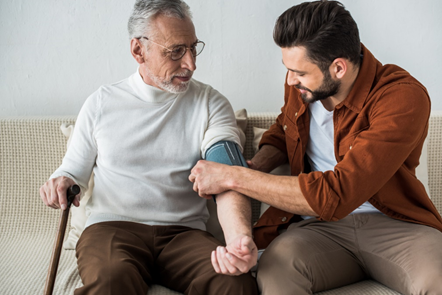
The Dangers of Hypertension: How to Recognize and Respond to a High Blood Pressure Emergency
“Blood pressure” is the medical term for the amount of force exerted by circulating blood against the walls of arteries. It’s normal for blood pressure to rise and fall throughout the day, but for people with hypertension, blood pressure remains consistently high, increasing the risk of serious medical issues. According to the CDC, 108 million people — nearly half the adult population of the United States — are affected by hypertension, or as it is more commonly known, high blood pressure.
Blood pressure monitors record two measurements: systolic blood pressure and diastolic blood pressure. Systolic pressure measures pressure in the arteries when the heart beats, while diastolic measures the pressure while the heart rests between beats. Systolic pressure is always listed before diastolic pressure, along with the unit for this measurement of pressure, “mmHg.”
Blood pressure falls within a healthy range when systolic pressure is below 120 and diastolic blood pressure is below 80, or 120/80mmHg, most often read as “120 over 80.” Those with hypertension have consistent blood pressure readings greater than 130 over 80. If you’re caring for a loved one with hypertension, it’s possible that you’re already using a blood pressure monitor at home to help manage their health.
Uncontrolled high blood pressure is typically a chronic condition that can gradually damage the heart, arteries, kidneys, and even the eyes and brain. It increases a person’s risk of heart disease, stroke, dementia, and other health conditions such as macular degeneration.
Many family members caring for loved ones with hypertension will help to limit this damage by facilitating lifestyles changes, including healthy diet and exercise, as well as assisting with medications that lower blood pressure.
But for those with high blood pressure that’s not well controlled my medication or proves difficult to manage, sudden and dangerous spikes in blood pressure that exceed 180 over 120 may occur. This is known as a hypertensive crisis, which may require immediate medical attention. Read on to learn when hypertension becomes an emergency, and how to react to protect your loved ones.
When is High Blood Pressure a Medical Emergency?
A hypertensive crisis is a quick and rapid increase in blood pressure to levels above 180 over 120. Blood pressure left untreated at these elevated levels can lead to severe health complications, including:
- Memory loss
- Stroke
- Loss of consciousness
- Heart attack
- Kidney damage
If you come across these readings while measuring a loved one’s blood pressure, be prepared to take action if necessary.
Symptoms of a Blood Pressure Emergency
When certain physical symptoms accompany elevated blood pressure, the situation could be life-threatening. Some of these symptoms include:
- Severe headache, confusion, and blurred vision
- Shortness of breath
- Nosebleed
- Severe anxiety
- Nausea and vomiting
- Seizures
Experiencing these symptoms can be overwhelming, and loved ones may not be able to articulate what’s happening to them. Family caregivers should be familiar with the warning signs of these conditions to recognize when an emergency arises.
Two Types of Hypertensive Crisis
There are two main types of hypertensive crisis that require different levels of action.
- Hypertensive Urgency. Blood pressure that rises above 180 over 120 without the presence of physical symptoms such as chest pain or shortness of breath is not an immediate cause for alarm. In the absence of any physical discomfort, wait for about five minutes and repeat the blood pressure measurement again. There may be a something wrong with the monitor, or the reading may come down on its own. Hypertensive urgency is often diagnosed during routine physical examinations. If your loved one’s readings are still high after taking several reading, contact their doctor right away. Monitor their condition closely for any symptoms that might suggest a hypertensive emergency.
- Hypertensive Emergency. Elevated blood pressure levels above 180 over 120 that are accompanied by physical symptoms should always be treated as an emergency. Seek immediate medical care for your loved one at a hospital emergency room at the first sign of symptoms. Call 911 if necessary. Organ damage can progress rapidly if a hypertensive emergency is left untreated. If your loved one starts presenting any symptoms such as those listed above, take them to a hospital emergency room as quickly as possible. Be prepared to present your loved one’s history of high blood pressure to nurses and staff.
Causes of a Blood Pressure Emergency
While a hypertensive crisis can occur at any time, there are some risk factors and medical situations that can cause a sudden rise in blood pressure. This includes:
- Not taking prescribed blood pressure medication
- Heart attack
- Kidney failure
- Heart failure
- Stroke
- Medication side effects or interactions
Again, understanding the symptoms and warning signs of these conditions improves your ability to recognize a potential crisis and take appropriate action.
Hypertension is one of the most common chronic conditions in the United States. While high blood pressure can often be managed either by medication or certain lifestyle changes, consistently high numbers can result in severe damage without proper attention. By understanding how to recognize the signs and symptoms of a high blood pressure emergency, you can ensure a loved one receives timely care when it matters most.
Need help caring for a loved one with hypertension or other chronic conditions? Learn more about Seniorlink’s coaching and support program for caregivers of Medicaid-eligible friends and family members.


